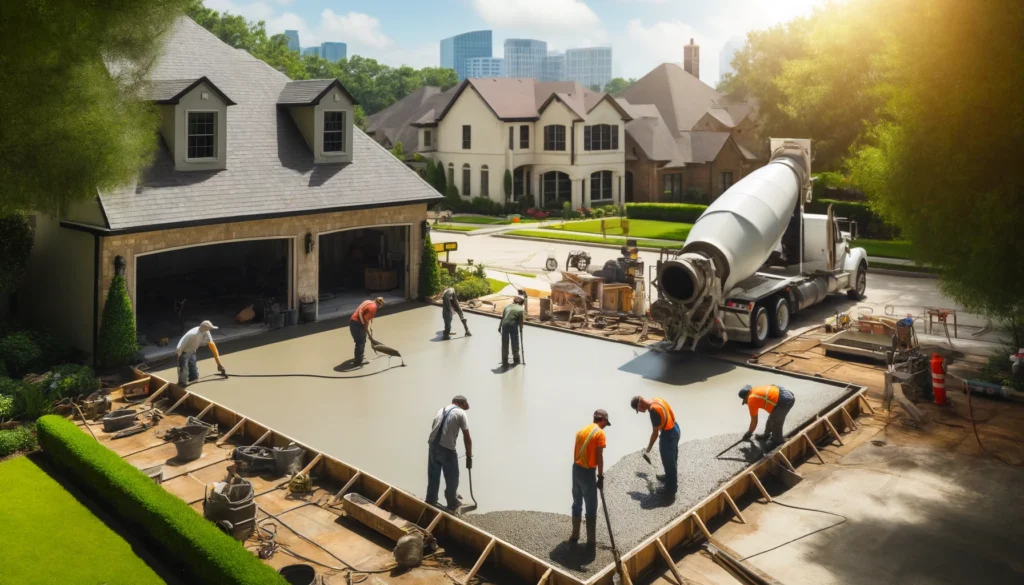Outline
Introduction
- Overview of the importance of concrete in construction
- Why hiring a professional concrete contractor matters
Understanding Concrete Work
- Types of concrete services
- The role of a concrete contractor
Types of Concrete Projects
- Residential concrete projects
- Driveways
- Patios
- Sidewalks
- Commercial concrete projects
- Foundations
- Parking lots
- Walkways
- Industrial concrete projects
- Warehouses
- Heavy machinery foundations
Benefits of Hiring a Professional Concrete Contractor
- Expertise and experience
- Quality of work
- Time efficiency
- Cost-effectiveness
Choosing the Right Concrete Contractor
- Credentials and certifications
- Experience and portfolio
- Reviews and testimonials
- Insurance and bonding
Steps in a Concrete Project
- Initial consultation and site inspection
- Design and planning
- Material selection and procurement
- Preparation and excavation
- Formwork and reinforcement
- Pouring and finishing
- Curing process
- Final inspection and cleanup
Common Concrete Techniques
- Stamped concrete
- Stained concrete
- Polished concrete
- Exposed aggregate concrete
- Concrete overlays
Factors Affecting Concrete Quality
- Mix proportions
- Weather conditions
- Curing methods
- Construction techniques
Preventive Measures for Concrete Maintenance
- Regular inspections
- Sealing and waterproofing
- Crack repair
- Joint maintenance
Frequently Asked Questions (FAQs)
- How long does a concrete project typically take?
- What are the signs of quality concrete work?
- How can I maintain my concrete surfaces?
- What should I do if I notice cracks in my concrete?
Comprehensive Guide to Hiring a Concrete Contractor in Houston
Concrete is a fundamental material in construction, playing a vital role in various types of projects, from residential driveways to large industrial foundations. Hiring a professional concrete contractor ensures that your project is executed with precision, quality, and expertise. This guide will provide a thorough understanding of concrete work, the benefits of hiring professionals, and what to consider when selecting a concrete contractor in Houston.
Understanding Concrete Work
Types of Concrete Services
Concrete services encompass a wide range of tasks, including the construction of driveways, patios, sidewalks, foundations, and more. Each project type requires specific skills and techniques to achieve optimal results.
The Role of a Concrete Contractor
A concrete contractor is responsible for managing all aspects of a concrete project, from planning and material selection to execution and finishing. They ensure that the project meets the required standards and specifications.
Types of Concrete Projects
Residential Concrete Projects
Driveways
Concrete driveways are durable and can withstand heavy traffic. A professional contractor will ensure proper installation, which includes site preparation, pouring, and finishing.
Patios
Concrete patios offer a versatile and aesthetically pleasing outdoor space. Techniques like stamping and staining can enhance the visual appeal.
Sidewalks
Concrete sidewalks provide safe and durable pathways. Proper construction involves ensuring a level surface and adequate thickness to prevent cracking.
Commercial Concrete Projects
Foundations
A solid foundation is crucial for any commercial building. Professional contractors use precise methods to ensure the stability and longevity of the foundation.
Parking Lots
Concrete parking lots are designed to handle heavy vehicles and high traffic volumes. Proper installation and maintenance are key to their durability.
Walkways
Commercial walkways need to be both functional and visually appealing. Contractors use various finishing techniques to achieve the desired look and functionality.
Industrial Concrete Projects
Warehouses
Concrete floors in warehouses need to be robust to support heavy machinery and equipment. Specialized techniques ensure durability and resistance to wear and tear.
Heavy Machinery Foundations
These foundations require precise engineering and construction to support heavy machinery and equipment safely.
Benefits of Hiring a Professional Concrete Contractor
Expertise and Experience
Professional contractors have the necessary skills and knowledge to handle complex concrete projects, ensuring high-quality results.
Quality of Work
Hiring a professional guarantees that the work meets industry standards, providing a durable and aesthetically pleasing finish.
Time Efficiency
Experienced contractors can complete projects efficiently, reducing downtime and ensuring timely project completion.
Cost-Effectiveness
Professionals can source materials at better prices and reduce the risk of costly mistakes, making the overall project more cost-effective.
Choosing the Right Concrete Contractor
Credentials and Certifications
Ensure the contractor has the necessary licenses and certifications to perform concrete work in Houston.
Experience and Portfolio
Review the contractor’s past projects to gauge their experience and expertise in handling similar projects.
Reviews and Testimonials
Check online reviews and ask for testimonials from previous clients to understand the contractor’s reputation.
Insurance and Bonding
Ensure the contractor has adequate insurance and bonding to protect against any potential damages or liabilities.
Steps in a Concrete Project
Initial Consultation and Site Inspection
The contractor will assess the site and discuss project requirements to provide an accurate estimate and plan.
Design and Planning
Detailed design and planning ensure that all aspects of the project are considered and addressed.
Material Selection and Procurement
Selecting the right materials is crucial for the project’s success. The contractor will procure high-quality materials based on the project specifications.
Preparation and Excavation
Proper site preparation and excavation are essential for a stable and durable concrete structure.
Formwork and Reinforcement
Formwork holds the concrete in place while it cures, and reinforcement (like rebar) adds strength and durability.
Pouring and Finishing
The concrete is poured into the formwork and finished using various techniques to achieve the desired texture and appearance.
Curing Process
Proper curing is vital for the concrete to reach its maximum strength and durability.
Final Inspection and Cleanup
The contractor will inspect the finished project to ensure it meets all specifications and clean up the site.
Common Concrete Techniques
Stamped Concrete
Stamped concrete mimics the appearance of other materials like stone or brick, providing a decorative finish.
Stained Concrete
Staining adds color to the concrete, enhancing its visual appeal.
Polished Concrete
Polished concrete provides a sleek and shiny finish, often used in commercial and industrial settings.
Exposed Aggregate Concrete
This technique exposes the aggregate within the concrete, creating a textured and visually interesting surface.
Concrete Overlays
Overlays are used to resurface existing concrete, providing a new finish without the need for complete replacement.
Factors Affecting Concrete Quality
Mix Proportions
The correct mix of cement, water, and aggregate is essential for strong and durable concrete.
Weather Conditions
Extreme weather conditions can affect the curing process and overall quality of the concrete.
Curing Methods
Proper curing methods ensure the concrete reaches its full strength and durability.
Construction Techniques
Using the right techniques during construction ensures the concrete is properly placed and finished.
Preventive Measures for Concrete Maintenance
Regular Inspections
Regular inspections help identify and address issues before they become major problems.
Sealing and Waterproofing
Sealing and waterproofing protect the concrete from moisture and other elements, extending its lifespan.
Crack Repair
Addressing cracks promptly prevents further damage and extends the life of the concrete surface.
Joint Maintenance
Proper maintenance of joints prevents water infiltration and damage to the concrete.
Frequently Asked Questions (FAQs)
How long does a concrete project typically take?
The duration of a concrete project depends on its size and complexity. Small residential projects may take a few days, while larger commercial or industrial projects can take several weeks.
What are the signs of quality concrete work?
Signs of quality concrete work include a smooth, even finish, properly aligned joints, and the absence of cracks or defects.
How can I maintain my concrete surfaces?
Regular cleaning, sealing, and prompt repair of any cracks or damage can help maintain concrete surfaces.
What should I do if I notice cracks in my concrete?
If you notice cracks in your concrete, it’s important to address them promptly to prevent further damage. Consult a professional contractor for the best repair methods.
Conclusion
Hiring a professional concrete contractor in Houston ensures that your project is completed with the highest standards of quality and efficiency. From residential driveways to large industrial foundations, a skilled contractor can handle all aspects of your concrete needs. Make sure to choose a contractor with the right credentials, experience, and reputation to ensure a successful project.


